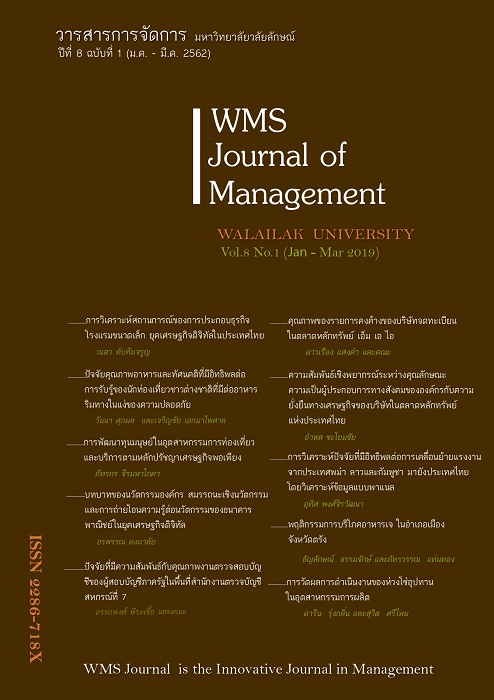Human capital development in the tourism and hospitality industry By Sufficiency Economy Philosophy
Main Article Content
Abstract
This study aims to present the concept of human capital development in the tourism and hospitality industry by Sufficiency Economy Philosophy. In the tourism and hospitality industry, any activity requires human capital to drive the organization to success in the workplace. Human resource is different from other resource due to human emotions. The mind needs to take care of the development of human capital in the tourism and hospitality industry by applying the king's philosophy of sufficiency economy to sustainable development. The guiding principle consists of three rings: 1. Moderation2. Reasonableness 3. Self-immunity system and two conditions are: 1. Knowledge base 2. Morality base, which the application of the king's Philosophy must be done with love, Desire and heart as well as changeful of person, time and situation. The result of King's development of human capital will bring knowledge, skills, competency and personal experience which finalize as the benefit of human happiness, life sufficiency and harmony which turn out as a sustainable human development.
Article Details
References
Anan, A. (2007). pratyā sētthakit phō̜phīang road to sustainable economy [Sufficiency economy road to sustainable economy]. Bangkok: Med Sai Printing Limited Partnership.
Berger, A.L., & Berger, R. (2004). The talent management handbook: creating organizational excellence by identifying, developing and promoting your best people. New York: McGraw-Hill.
Brahmagunabhorn, P. (2005). sētthasāt nǣo phut [Buddhist economics]. Wat Nyanavesakavan.
Braun, M. (2014). Human resources professional competency framework. Human Resources Professionals Association (HRPA). Retrieved from http://www.academia.edu/19550039/HRPA_Professional_HR_Competency_Framework
Buckingham, M., & Clifton, O.D. (2014). Strengthsfinder. The Gallup Organization.
Craig, R. (1976). Training and development handbook. NY: McGraw-Hill.
Foote, N.N., & Cottrell, L.S. (1955). Identity and interpersonal competence. Chicago, MI: University of Chicago Press.
Gilley, J.W., Eggland, S., & Gilley, A.M. (2002). Principles of human resource development. (2nd ed.). Cambridge: MA: Basic Books.
Holland, J.L., & Baird, L.L. (1968). An interpersonal competency scale. Educational and Psychological Measurement, 28(2), 503-510.
Jombunud, C. (2011). thun manut kap kānphatthanā thurakit thō̜ngthīeo [Human capital and tourism business development]. Integrated Human Development Center.
Luepong, P. (2012). kānphatthanā thun manut hai mī samatthana khwāmsāmāt nai kān khǣngkhan [The Competency Development of Human Resource]. Executive Journal, 32(4), 103-108.
Maharatsakul, P. (2013). kānčhatkān læ kānphatthanā sapphayākō̜n manut [Managing and developing human resources]. Bangkok, Thailand: Panyachon Distributor.
Nadler, L. (1970). Developing human resource. Houston, TX: Gulf Publishing Company.
Nadler, Z., & Nadler, L. (1987). The handbook of human resource development. NY: John Wiley and Sons.
Nanthaphaibun, C. (2012). sinlapa kānhai bō̜rikān [The art of service]. Bangkok: Se-Education.
Office of the Higher Education Commission. (2009). krō̜p māttrathān khunnawuthi : kānphatthanā rāilaʻīat khō̜ng laksūt læ rāiwichā hai mī khunnaphāp [Qualifications Framework: the developing quality curriculum and course content]. on September 30 – October 2, 2009 at Radisson Suits Bangkok.
Office of the National Economic and Social Development Board. (2007). sētthakit phō̜phīang [Sufficiency economy]. Bangkok, Thailand: Office of the National Economic and Social Development Board.
Okazaki, E. (2008). A community-based tourism model: its conception and use. Tourism, 16(5), 511-529.
Praphanphong, R. (2016). sētthakit phō̜phīang læ thritsadī mai [Sufficiency economy and new theory]. (2nd ed.). Bangkok, Thailand: Sataporn Books.
Puvitayaphan, P. (2008). konlayut kānphatthanā sapphayākō̜n manut [Strategic human resource development]. (2nd ed.). Bangkok: HR Center.
Rurkkhum, S. (2014). kānphatthanā sapphayākō̜n manut : lakkān læ kān prayuk [Human resource development: principles and applications]. Bangkok, Thailand: Chula Press.
Sathirathai, S. (2007). pratyā sētthakit phō̜phīang: road to sustainable economy [Sufficiency economy philosophy: road to sustainable economy]. Bangkok, Thailand: KK Publishing.
Sriviboon, C. (2014). Human resource management and development. Bangkok, Thailand: Na-Petch.
Suansri, P. (2003). khūmū kānčhatkān thō̜ngthīeo dōi chumchon [Community based tourism handbook]. Bangkok, Thailand: Life and Nature Travel Project.
Swanson, E.F., & Holton, R.A.III. (2009). Foundations of human resource development. San Francisco, PN: CA: Barrett-Koehler.
Teungfung R., & Jitvirat, K. (2009). kānphatthanā thun manut phāitai kān plīanplǣng chœ̄ng phonlawat [Human capital development in dynamic change]. Modern Management Journal, 7(2), 27-40.
Thepsitha, S. (2006). kān dœ̄n tām rō̜i phrayukhonlabāt [Following the royal path]. (3rd ed.). Bangkok, Thailand: The Young Buddhists Association of Thailand under the Royal Patronage.
The Thai Chamber of Commerce and Board of Trade. (2007). sētthakit phō̜phīang pratyā mai nai yuk lōkāphiwat [Sufficiency economy: a new philosophy in the global world]. Bangkok, Thailand: University of the Thai Chamber of Commerce.
Wannathanom, C. (2017). kotmāi kānthō̜ngthīeo Thai [Thai tourism law]. Bangkok: 3 Lada Limited Partnership.
Wongthongdee, S. (2013). kānphatthanā sapphayākō̜n manut [Human resource development]. Bangkok, Thailand: Chula Press.


